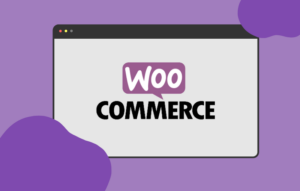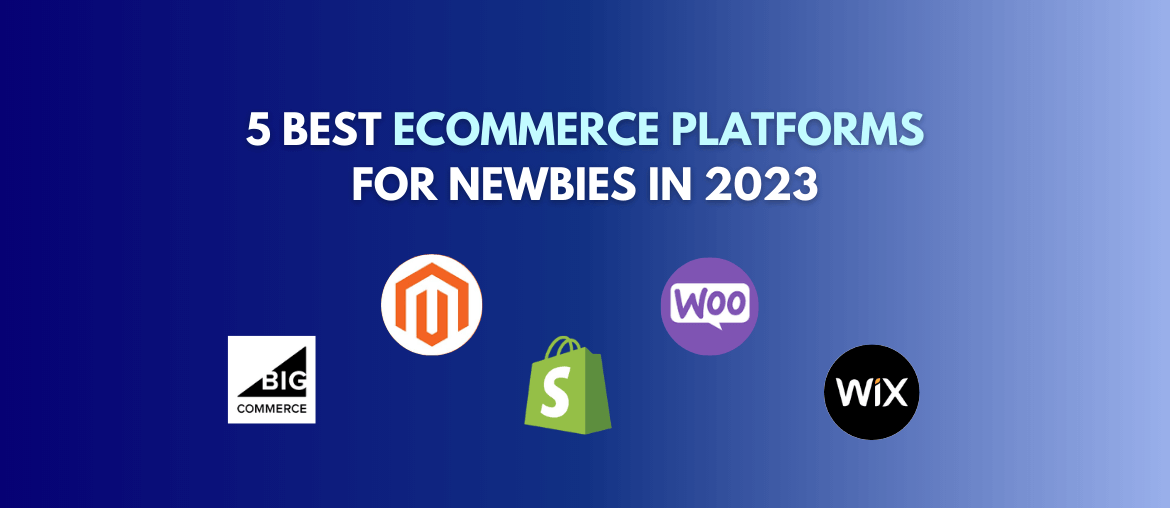In recent years, eCommerce has become a crucial part of global retail. Like other industries, buying and selling goods have undergone a significant transformation with the internet’s advent. With internet access rapidly increasing, the number of people making purchases online continues to grow. According to an analysis of Statista, in 2022, it was estimated that there were 5.3 billion internet users globally, up from 4.9 billion the previous year, representing around 66 percent of the global population. This upward trend shows how eCommerce Platforms are gaining popularity and becoming increasingly important in today’s interconnected world.
For businesses to succeed and remain competitive in the rapidly changing retail industry, they must make necessary adjustments to the digital environment. In particular, the online company assists start-up businesses in reducing risks and saving human resources. Additionally, it helps them save investment funds for shop premises. The use of an eCommerce platform is one of the most efficient methods to bring about this shift. Your store will gain significantly from this effective instrument, enabling you to expand your level of success.
What is an eCommerce Platform?
Table of Contents
To gain a comprehensive understanding of the subject, let’s begin with the definition of eCommerce: E-commerce, short for electronic commerce, encompasses the buying and selling of products and services, as well as the exchange of payments or data over an electronic network, primarily the internet. It covers various types of commerce, including B2B (business to business), B2C (business to consumer), C2C (consumer to consumer), and C2B (consumer to business).
In essence, an eCommerce platform refers to a software solution that facilitates the online buying and selling processes for businesses. It serves as an environment where different types of commerce can thrive. This platform offers an array of features to help enterprises to manage their virtual assets, employ omnichannel marketing strategies, facilitate digital sales, and streamline operations. Much like traditional commerce, consumers can use an eCommerce platform to explore products, make purchases, and conduct transactions securely. Moreover, the platform fosters accessible communication among users, allowing them to share information about products, item categories, or stores.
Both businesses and customers play critical roles in this ecosystem. The quality and relevancy of an eCommerce platform’s content, which is given by both firms and customers, determines its success and value. In other words, the more valuable and engaging the content, the better the platform performs in creating a positive online shopping experience and promoting a vibrant online community.
Benefits of eCommerce Platforms Bring Your Store
Expanding Your Reach
By using an eCommerce platform, you may overcome the geographical limits of a physical business. Your products and services become available to clients worldwide, allowing you to enter a global market. The internet has no limitations, and with the right plan, you can contact potential clients from all over the world, bringing up enormous development chances for the business you run.
Improved Customer Service
An eCommerce platform enables you to give outstanding customer service via numerous channels such as live chat, email, and phone. Customer satisfaction and loyalty may be considerably increased by providing prompt and excellent customer care.
Besides, unlike traditional brick-and-mortar stores with fixed operating hours, an eCommerce platform enables you to stay open 24/7. Customers can browse, shop, and make purchases at any time, increasing the convenience and accessibility of your store.
Reduce Operational Costs
Running an eCommerce shop often has fewer overhead expenses than maintaining a traditional location. E-commerce does not require significant initial investment and can be a cost-effective strategy to expand your business. Moreover, getting a domain, hosting, or paying for web design and dependable e-commerce services is less expensive in the long term than owning or renting physical company space. Additionally, automation keeps all of your inventory and money in one place, and chatbots may assist you with customer complaints, allowing you to optimize your spending.
Marketing Opportunities
E-Commerce platforms offer various marketing tools and features to promote your products and engage customers. You can run targeted marketing campaigns, offer discounts, and implement loyalty programs to attract and retain customers
Simplify Buying Process and Flexibility
Online selling and purchasing is a more direct type of trade. Customers are not required to go to the store or physically complete the process of buying after looking for and locating the desired goods. They also save time and effort by not having to visit the store and may have what they need to be supplied from anywhere in the world. It can also be shown how advantageous e-commerce was throughout the epidemic.
Analyze consumer behavior
An eCommerce platform provides valuable insights into customer behavior, preferences, and purchasing patterns. By analyzing this data, you can gain a deeper understanding of your target audience. Refine your product offerings based on the insights. Tailor your marketing strategies for maximum effectiveness. Informed decisions based on data ensure that your store remains relevant and customer-centric.
With the help of several analytics tools and AI technologies, you can learn about the buying habits of your customers. This lets you tailor your offer and act quickly in response to their needs and changing trends.
How to Choose eCommerce Platforms Suitable for Your Store
Selecting the right eCommerce platform for your store is a critical decision that can significantly impact your business’s success. Here are essential steps to help you choose an eCommerce platform that suits your specific needs:
- Define Your Requirements: Start by identifying your store’s specific requirements and goals. Consider factors such as the type of products you sell, your target audience, expected website traffic, scalability needs, and budget constraints. Understanding your business’s unique needs will guide you in selecting the most suitable platform.
- Evaluate Ease of Use: Look for an eCommerce platform that is user-friendly and easy to navigate. This applies both for you as the store owner and for your customers. Moreover, a simple and intuitive interface will save you time on setup and maintenance. It will also ensure a seamless shopping experience for your customers.
- Mobile Responsiveness: With the increasing use of mobile devices for online shopping, it’s crucial to choose a platform that provides a responsive and mobile-friendly design. Ensure that your online store looks and functions well on various devices to cater to a broader customer base.
- Payment Gateways and Security: Check the available payment gateways supported by the platform and their security measures. A reliable and secure payment processing system is essential to build trust with your customers and protect sensitive financial information.
- Customization and Design Options: Assess the level of customization the eCommerce platform offers. Look for themes, templates, and design options that allow you to create a unique and visually appealing online store that aligns with your brand identity.
- Scalability and Flexibility: Consider your store’s growth potential and choose a platform that can accommodate increasing traffic and product offerings. The platform should be flexible enough to integrate with third-party tools and plugins. This will also allow you to add new functionalities as your business expands.
- SEO and Marketing Features: Ensure that the eCommerce platform provides essential SEO tools to improve your store’s visibility in search engine results. Look for built-in marketing features like discount codes, abandoned cart recovery, and email marketing integration to boost customer engagement.
- Support and Resources: Assess the level of customer support offered by the platform provider. Prompt and helpful help can be crucial in resolving issues and keeping your store running smoothly. Also, check for available resources like documentation, tutorials, and a supportive community.
- Budget and Costs: Compare the pricing plans of different eCommerce platforms. Consider the overall costs, including transaction fees, payment processing fees, and additional add-ons. Balance the features and benefits with your budget constraints.
- Reviews and Recommendations: Research and read reviews from other merchants who have used the platform you are considering. Besides, feedback from existing users can provide valuable insights into the platform’s strengths and weaknesses.
- Trial Period: Many eCommerce platforms offer a free trial or demo period. Take advantage of these trials to test the platform’s features, ease of use, and compatibility with your business needs before making a final decision.
By following these steps and conducting thorough research, you can select an eCommerce platform. This platform will align perfectly with your store’s requirements, setting the foundation for a successful and thriving online business.
5 Best eCommerce Platforms for Newbies
The following five eCommerce platforms were among the best choices for creating an online store. However, please note that the landscape of eCommerce platforms is constantly evolving, and new options may have emerged since then. It’s always a good idea to conduct your research and check the latest reviews before making a decision.
Additionally, we researched and shortlisted many major e-commerce platforms based on business purpose, pricing, functionality, scalability, and other factors. We also provide some highlight features, as well as pricing references, for each platform for your consideration. Here are our top recommendations.
Magento

Magento is a powerful, open-source eCommerce platform that caters to medium to large businesses. It offers extensive customization options, robust features, and high-level scalability. So, Magento requires more technical expertise to set up and manage, making it more suitable for experienced developers or larger enterprises.
- Highlight Features:
- A robust set of built-in features
- Support for multiple storefronts
- Access to a large community of developers
- Scalable and flexible
- API: REST API, GraphQL
- Pricing: Varies based on business size and features
If you’re working with Magento, incorporating Magento extensions becomes essential. They serve as indispensable support tools for your business, enabling comprehensive and efficient completion and development.
And, are you looking for Magento 2 extensions to enhance your store? We are here to help!
Shopify

Shopify is a popular and user-friendly eCommerce platform that caters to businesses of all sizes. Besides, it offers a wide range of customizable templates, an intuitive interface, and a robust app store for adding extra functionalities. With excellent customer support and reliable hosting, Shopify is an excellent choice for both beginners and experienced entrepreneurs.
- Highlight Features:
- A user-friendly interface
- Access to a large app store for added functionality
- Seamless integration with popular payment gateways
- Responsive customer support
- API: REST API, GraphQL
- Pricing: $29-$299/month
Thousands of people choose Magento 2 and Shopify as the two most dependable eCommerce systems in the world. Magento is an open-source platform, offering greater flexibility and customization options, making it suitable for large and complex online stores. Besides, developers can tailor the platform extensively to meet specific business needs. On the other hand, Shopify is a hosted platform, that provides a user-friendly experience with easy setup and maintenance. It is ideal for small to medium-sized businesses and those without technical expertise. While Magento offers more advanced features and scalability, it requires more technical knowledge and hosting setup. Shopify, in contrast, is more beginner-friendly but might have limitations in customization for highly specialized requirements. Ultimately, the choice between Magento and Shopify depends on the size, complexity, and specific requirements of the e-commerce store.
Read the following articles: Shopify Vs Magento – Which One Is Suitable For You?
WooCommerce

As a plugin for WordPress, WooCommerce is an open-source eCommerce platform that provides flexibility and scalability. Moreover, it offers numerous extensions, themes, and plugins to create a customized online store that seamlessly integrates with your WordPress website. Thus, it’s an ideal choice for businesses already using WordPress and seeking more control over their store’s design and functionality.
- Highlight Features:
- A wide range of plugins and extensions for added functionality
- Access to a large community of developers
- Customizability through themes and templates
- Scalable and flexible
- API: REST API
- Pricing: Free (with hosting and plugin costs)
WooCommerce is also a popular platform as Magento and Shopify, each with its own set of strengths and advantages. Magento is a robust, feature-rich, and highly customizable open-source platform, making it an excellent choice for large and enterprise-level online stores. On the other hand, WooCommerce is a powerful WordPress plugin, designed for small to medium-sized businesses and startups. WooCommerce also is user-friendly, easy to set up, and offers a vast selection of extensions to add additional functionality to your online store. Additionally, the size, complexity, and particular requirements of your e-commerce endeavor ultimately determine which platform you should use—Magento or WooCommerce.
Read the following articles: Magento Vs WooCommerce: Which One Was Developed For You?
BigCommerce

BigCommerce is a feature-rich eCommerce platform known for its scalability and performance. Besides, it provides a range of built-in features, easy-to-use tools, and multiple payment gateway options. BigCommerce is suitable for growing businesses with ambitious expansion plans.
- Highlight Features:
- A robust set of built-in features
- Access to a large app store for added functionality
- Support for multi-channel selling
- Responsive customer support
- API: REST API
- Pricing: $29.95-$299.95/month
Wix eCommerce

Wix eCommerce is a user-friendly website builder that also offers eCommerce capabilities. Moreover, it provides a drag-and-drop interface and a variety of templates to create a visually appealing online store. While it may not have the same level of flexibility as some other platforms, it is an excellent choice for small businesses and entrepreneurs looking for simplicity and ease of use.
- Highlight Features:
- User-friendly website builder with drag-and-drop.
- Variety of professional eCommerce templates.
- Mobile-optimized shopping experience.
- Easy product management and multiple payment options.
- API: REST API
- Pricing: $27-$159/month
Conclusion
In conclusion, choosing the appropriate eCommerce platforms is essential for starting a successful and flourishing online business in 2024. This is especially important for new business owners entering the world of online retail. We looked at five of the top eCommerce systems that are designed with beginners in mind, offering intuitive user interfaces, necessary functionality, and top-notch customer service.
The ideal platform ultimately depends on personal tastes, company needs, and objectives for future expansion. Newcomers may make an informed choice and start a successful eCommerce journey in 2024 and beyond by carefully weighing these elements.
